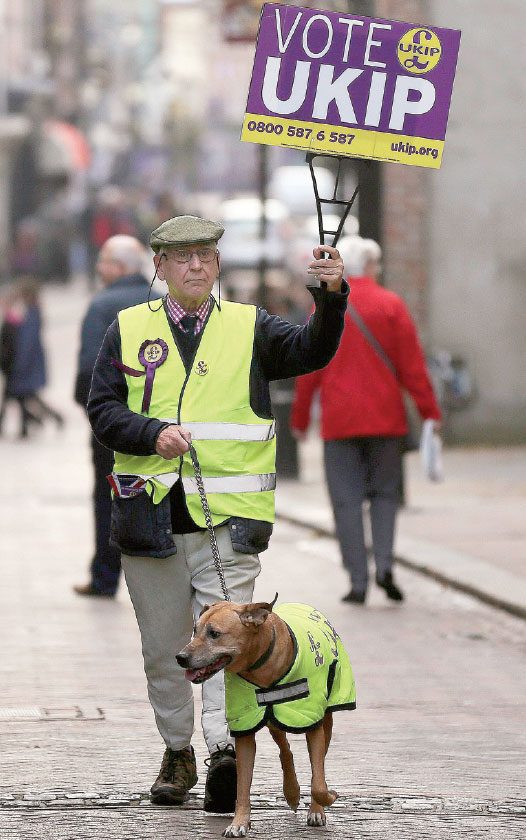Cameron risks losing out to anti-EU UKIP as two-party system creaks
British Prime Minister David Cameron's Conservatives risked losing a second parliamentary seat to the anti-EU UKIP party on Thursday, foreshadowing a possible political upheaval in next year's national election.
With distrust of mainstream parties and anxiety about immigration rising among voters across much of the country, four opinion polls suggested that UKIP - the United Kingdom Independence Party - would win Thursday's by-election in the southeast English constituency of Rochester and Strood.
Thursday's vote was called when Mark Reckless, the constituency's Conservative Member of Parliament, resigned after defecting to UKIP, which favors an immediate British withdrawal from the European Union and sharply lower immigration.
Exit from the EU
Victory for Reckless, who is seeking to regain the seat for UKIP, would deepen fears among European partners of a possible British exit from the EU. It would also deal a serious blow to Cameron, who ordered his party to mobilize all its resources to hold Rochester, and visited the area five times before the ballot.
Results of the vote, which follows a by-election last month at which another Conservative defector won UKIP's first elected seat in Parliament, were expected on Friday morning.
Success for UKIP would deepen Conservative fears of a split right-wing vote in the election to the Westminster parliament in May 2015, making it harder for Cameron to hold onto power. This could stoke disquiet about his leadership among Conservative lawmakers, some of whom might also be tempted to defect.
"If I do win, there will be a significant change in people's assumptions about UKIP," Reckless said. "People will realize that we're credible and a party that is likely to win many more seats in Westminster next year."
Reckless defected in September, saying he had lost faith in Cameron's promise to wring serious reform from the EU if a Conservative government is re-elected.
Reckless declined to forecast if a UKIP victory would encourage more defections, but said the contest is part of a reordering of Britain's traditional two-party system.
'Closet racists'
Cameron's party and the left-leaning Labour Party have taken turns to govern Britain since World War II, but their collective support is waning. Cameron was forced into a coalition with the center-left Liberal Democrats after failing to win an outright majority four years ago.
At least one opinion poll has since suggested that combined voter support for the two main parties has dipped below 60 percent for the first time since then.
At the same time, UKIP, broadly to the right of the Conservative Party, and the Scottish National Party, broadly to the left of the Labour Party, have exploited voters' disenchantment to siphon off support from both.
Cameron's party narrowly trails Labour in opinion polls but neither looks likely to win outright, raising the prospect of a power-sharing deal with a smaller party.
Cameron once described UKIP as "closet racists", but apart from poaching two of his lawmakers, it also won European elections in the United Kingdom in May.
He tried to neutralize UKIP by promising to renegotiate Britain's EU ties before holding a referendum on membership in 2017. But he has not so far spelt out exactly what changes he wants or forged strong alliances with EU partners to win them.
|
A UKIP supporter canvasses for votes in Rochester, southeast England, on Tuesday. The party looked poised to win its second parliamentary seat on Thursday. Paul Hackett / Reuters |
(China Daily 11/21/2014 page11)









